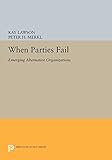When Parties Fail : Emerging Alternative Organizations / ed. by Peter H. Merkl, Kay Lawson.
Material type: TextSeries: Princeton Legacy Library ; 911Publisher: Princeton, NJ : Princeton University Press, [2014]Copyright date: ©1988Edition: Course BookDescription: 1 online resource (606 p.)Content type:
TextSeries: Princeton Legacy Library ; 911Publisher: Princeton, NJ : Princeton University Press, [2014]Copyright date: ©1988Edition: Course BookDescription: 1 online resource (606 p.)Content type: - 9780691605531
- 9781400859498
- 324.2 23
- online - DeGruyter
- Issued also in print.
| Item type | Current library | Call number | URL | Status | Notes | Barcode | |
|---|---|---|---|---|---|---|---|
 eBook
eBook
|
Biblioteca "Angelicum" Pont. Univ. S.Tommaso d'Aquino Nuvola online | online - DeGruyter (Browse shelf(Opens below)) | Online access | Not for loan (Accesso limitato) | Accesso per gli utenti autorizzati / Access for authorized users | (dgr)9781400859498 |
Frontmatter -- Contents -- PART I. Introduction -- ONE. Alternative Organizations: Environmental, Supplementary, Communitarian, and Antiauthoritarian -- TWO. When Linkage Fails -- PART II. Environmentalist Organizations -- THREE. The Challenge of the Greens to the West German Party System -- FOUR. The Swedish Five-Party Syndrome and the Environmentalists -- FIVE. The Italian Radicals: New Wine in an Old Bottle -- SIX. Civic Action Groups in Switzerland: Challenge to Political Parties? -- SEVEN. Community Groups as Alternative Political Organizations in Chicago -- EIGHT. Sanrizuka: A Case of Violent Protest in a Multiparty State -- PART III. Supplementary Organizations -- NINE. The Social Democratic Party in Britain: Protest or New Political Tendency? -- TEN. The Defeat of All Parties: The Danish Folketing Election, 1973 -- ELEVEN. Parties and Political Action Committees in American Politics -- PART IV. Communitarian Organizations -- TWELVE. The Failure of Israel's Labor Party and the Emergence of Gush Emunim -- THIRTEEN. When Parties Fail: Ethnic Protest in Britain in the 1970s -- FOURTEEN. The National Democratic Party of Alabama and Party Failure in America -- FIFTEEN. Stealing Congress's Thunder: The Rise to Power of a Communist Movement in South India -- PART V. Antiauthoritarian Organizations -- SIXTEEN. The Limits of Organization and Enthusiasm: The Double Failure of the Solidarity Movement and the Polish United Workers' Party -- SEVENTEEN. Independents and Independence: Challenges to One-Party Domination in Taiwan -- EIGHTEEN. Political Party Failures and Political Responses in Ghana -- NINETEEN. When Parties Refuse to Fail: The Case of France -- TWENTY. Do Parties Persist or Fail? The Big Trade-off Facing Organizations -- PART VII. Conclusions -- TWENTY-ONE. The Challengers and the Party Systems -- Notes on Contributors -- Index
restricted access online access with authorization star
http://purl.org/coar/access_right/c_16ec
Throughout history parties have faltered and new groups have emerged, but rarely has this process been so accelerated, so widespread, and so conducive to dramatic political change as in our present era. When Parties Fail explores alternative organizations in depth and comparatively. Among the organizations discussed are environmentalist groups, such as the West German and Swedish Greens, the Italian Radicals, and local protest groups in Japan, Switzerland, and the United States. Also considered are new groups seeking attention in unresponsive party systems, such as the Danish Gilstrup party, the British SDP, and American PACs; community parties and movements in Israel, India, Britain, and the American South; and antiauthoritarian movements in Poland (Solidarity), Taiwan, and Ghana. The case of France provides an example of major party survival. Three broadly comparative chapters consider the reasons for major party persistence in some nations and the causes and impact of their decline in others.The contributors to the book are David Apter, Myron J. Aronoff, Liang-shing Fan, Frank B. Feigert, Zvi Gitelman, Ronald J. Herring, Jon Kraus, Kay Lawson, Tom Mackie, Peter H. Merkl, Raffaela Y. Nanetti, Angelo Panebianco, Mogens N. Pedersen, Geoffrey Pridham, Peter Pulzer, Richard Rose, Donald Schoonmaker, Frank Sorauf, Robert C. A. Sorensen, Evert Vedung, Hanes Walton, Jr., and Frank L. Wilson.Originally published in 1988.The Princeton Legacy Library uses the latest print-on-demand technology to again make available previously out-of-print books from the distinguished backlist of Princeton University Press. These editions preserve the original texts of these important books while presenting them in durable paperback and hardcover editions. The goal of the Princeton Legacy Library is to vastly increase access to the rich scholarly heritage found in the thousands of books published by Princeton University Press since its founding in 1905.
Issued also in print.
Mode of access: Internet via World Wide Web.
In English.
Description based on online resource; title from PDF title page (publisher's Web site, viewed 30. Aug 2021)


